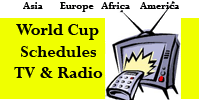"Team names for the Super Eight stage are indicative based on the top two teams from the Group Stage qualifying. If these two teams do qualify they will be seeded in position 1 or 2 as specified regardless of whether they finish first or second in their group. For example, if South Africa wins Group A and Australia comes second, for the purposes of the Super Eights, South Africa will still be A2 and Australia will be A1. If, for example, Scotland qualifies instead of Australia, Scotland will become A1."
That's an extract from the World Cup Schedule page on the official International Cricket Committee site. On this page, the ICC has shown us the likely contenders in the Super Eight matches - for example if the match is between A2 & B1, then the likely contestants should be India and Australia. It was funny why the ICC had gone to such ridiculous lengths to explain - that's where the fine print becomes important. Read on..
What the fine print means is that the ICC Cricket Ratings will rule. For example, even if India beats all other teams in its group, Sri Lanka may still finish on top of the group as far as the Super Eight is concerned because it's the ICC Cricket Ratings that will decide that.
I also don't know what the ICC means by that last statement: "If Scotland qualifies instead of Australia...how do we know who is qualifying instead of whom..what if Scotland and the Netherlands qualify?"



1 comment:
The system makes sense from the point of view of those attending matches in the Caribbean.
For instance, I have a ticket to a D2 game in Guyana. I'm a West INdies fan. WHether West INdies finishes 1st or second in their group, I know I'll be seeing West INdies.
If D2 had meant 'second place in group D' My ticket would be for an Ireland game and I'd be pretty upset right now.
Post a Comment